Become a Creator today!Start creating today - Share your story with the world!
Start for free
00:00:00
00:00:01

Arthur Conan Doyle (part 2)
We continue our discussion about Sir Arthur Conan Doyle, exploring how he wrote and how his works have been adapted.
Mentions:
Sherlock (BBC)
Elementary (CBS)
House (Fox)
The Enola Holmes Mysteries by Nancy Springer
https://www.arthur-conan-doyle.com/index.php/How_I_Write_My_Books
https://www.arthur-conan-doyle.com/index.php/Sir_Arthur_Conan_Doyle:Sherlock_Holmes
For more information: cluedinmystery.com
Instagram: @cluedinmystery
Contact us: hello@cluedinmystery.com
Music: Signs To Nowhere by Shane Ivers - //www.silvermansound.com
Transcript
Introduction to the Podcast
00:00:11
Speaker
Welcome to the Clued in Mystery podcast. I'm Sarah. And I'm Brooke, and we both love mystery.
Why is Sherlock Holmes Enduring?
00:00:18
Speaker
So Brooke, we're going to continue our conversation about Sir Arthur Conan Doyle and Sherlock Holmes. And kind of like with Chrissy, we could just talk for days and days about Sherlock. There's so much. One of the things that I was hoping we could talk about is the adaptations and that his stories continue to be adapted
00:00:40
Speaker
not only true to the time that they were written and that they were originally set, but there's modern day adaptations that give him a cell phone or that give him modern day scientific method to use in his investigations. And I think that just speaks to the enduring love that people have for this
Modern Adaptations of Sherlock Holmes
00:01:00
Speaker
character.
00:01:00
Speaker
I agree. It goes to show how we don't want to let him go. We want there to be this character who can always come in and solve the crime and save the day, so to speak, and make sure justice happens. And it's really fun to bring him into our
00:01:17
Speaker
current times and see the way he would interact in this day and age. And it's been really fun seeing that in film and TV and even books, as we'll talk about. If you think about when Doyle originally stopped writing Sherlock stories, and you mentioned in the first episode about Doyle, about how his mother wrote him a letter and asked him not to stop, that
00:01:39
Speaker
people were so passionate then and that passion I think has just continued to build. And as you say, we don't want to lose that character in our lives, right? And so that's, I think maybe one of the reasons why we continue to see these adaptations. And there've been in the last little while, last two decades, I guess, you know, I can think of a couple of TV adaptations. So obviously the BBC one with Benedict Cumberbatch as Sherlock. And then there was in the US,
00:02:07
Speaker
I don't remember what it was called, but with Johnny Lee Miller as Sherlock and was it Lucy Liu who was the Watson character? Yeah. I don't remember what that one was called. Yeah. I only saw a couple episodes of that and I don't recall the name either, but it was really fun to see a female Watson and it worked well together.
Sherlock Holmes's Influence on Other Characters
00:02:29
Speaker
I think it made it really fun.
00:02:31
Speaker
And then think about the program House, which was very much inspired by Sherlock Holmes, right? The name of the character, the fact that he was quite a gruff character. He was, you know, he had addiction issues. He was very musical, just as Sherlock is. And I guess his Watson character was Wilson, right? True.
00:02:54
Speaker
You're gonna laugh. I never put that together. Did you know that I never realized that? And I was a really big house fan, but it was in our research for this that like, you know, I was listening to a podcast or something and it mentioned that and I'm like, oh my goodness. And all the pieces fell in. I mean, even his address, he had the same house number. He, yes, that like, he's really hard to connect with. Everything about it is so inspired by Sherlock Holmes and I felt
00:03:23
Speaker
very foolish that I had never seen that because I really loved that series. Well, it only occurred to me when I started thinking about Doyle. I was like, okay, what are some other interpretations? I was like, Holmes, oh my goodness.
00:03:38
Speaker
It was so good. They did a really good job. They did a great job. And I think there are a lot of books that we can point to that draw on the Sherlock type character, whether they are stories that are told from the point of view of adjacent characters or think of Enola Holmes.
00:03:56
Speaker
which is his sister. Sherlock makes an appearance, but it's not so much about him as it is about her, but it's said in that world. I know we're going to speak to someone who does write in that space, and I think that will be really interesting to get some perspective on that as well. Yeah, I'm excited about that. For that upcoming interview, and just to go back to the Enola Holmes, I am a big Nancy Springer fan, and I think she's done a great job. I will actually
00:04:25
Speaker
to give props to Netflix because I really believe they did one of the best. I was the one saying that the book's always better, but they did a really great job of taking her stories and taking them to the film adaptation. They stayed fairly true to the story and just really made it come alive. Nancy can be really proud, I think, of those
00:04:49
Speaker
the work that Netflix is doing with their stories. Again, thinking about how we don't want this character to ever be gone. I know that Anthony Horowitz has written some additional Sherlock stories, right? Using those characters that Doyle created, and I believe he was commissioned by the Doyle estate to continue writing about Sherlock.
00:05:14
Speaker
Yeah, what an honor. I mean, that's such big shoes to fill, but I have a fun quote from Anthony Horowitz about how he apparently fell in love with the Sherlock character when he was 16. And he's talking in this article about what made him fall in love. And he said, it's the fog, the cobblestones, the fire flickering, the river Thames, the sound of the Stradivarius, the strange villains,
00:05:40
Speaker
It's the last gasp of English history before technology takes over. And it's just so beautiful. Yeah, wow. It kind of captures it really well there. And I think that is something we like about the stories is the entire mood and setting. But it made me think because we're talking about how there are these adaptations that bring him into our time.
00:06:05
Speaker
and Horowitz is saying it's before technology takes over. So I think it's interesting that but what we're finding is people will still love it even if he has a cell phone and a computer and you know there's something even deeper than that.
00:06:20
Speaker
Yeah, I think that's a really good point. There's just something about that character, no matter what setting he's in.
Arthur Conan Doyle's Writing Style
00:06:27
Speaker
I'm sure that there are Sherlock Holmes-esque stories that are set in outer space or other environments. If they capture the essence of the character, it kind of doesn't matter whether he's in the 21st century or 19th century or in London or in Tokyo or in New York, right?
00:06:51
Speaker
for sure, and that relationship. There's a lot to be said about the Holmes Watson relationship. It takes both of them. We always talk about Sherlock, but I really don't think he'd be who he is if he didn't have his Watson. I agree.
00:07:06
Speaker
One of the things that I looked up with respect to Doyle was how he wrote. And there's actually on one of the websites that I looked at that has extensive resources and information about Doyle, there's a copy of an essay that he wrote that is called How I Write My Books.
00:07:26
Speaker
That was originally published in the Strand magazine in 1924. I will put a link to the text of that article in the show notes. He, interestingly, wasn't really big on the details. One of the quotes from this article is, he says, as long as you produce your dramatic effect, accuracy of detail matters little. That is fascinating.
00:07:54
Speaker
Another one of the resources that I looked at points out the inconsistencies that are in his stories. So there's the text of the story, talks about the characters that are present, the settings. And then there's a couple of bullet points that talk about inconsistencies. He clearly wasn't focused on that. He really placed that emphasis on telling a good story. But he was a stickler for detail when he was writing historical fiction.
00:08:21
Speaker
And so he talks about how important if you're talking about, rather, if you're writing about something that happened in the past. In this essay, Doyle talks about how important it is that you get those details right. I think that's really interesting that he kind of drew a line for himself in terms of where he focused his attention.
00:08:42
Speaker
And this essay talks about how he would do his historical research, that he would make all of these notes associated with each of the characters so that he could know who knew what. And then the other thing that he talks about in this essay is about when he was really engaged in what he was doing, he could write for hours. And he talks about that he had
00:09:07
Speaker
I think it was a 10,000 word day. He said, I've had a couple of 10,000 word days, which is just mind-blowing to me, and that he'd written some of his shorter non-fiction pieces that were 30 or 40,000 words. He'd written those within a week.
Charm of Inconsistencies in Doyle's Stories
00:09:24
Speaker
He said, but I was really fired up about what
00:09:25
Speaker
what I was writing about. But he makes a point to say that he would take a break during the middle of the day and go for a walk. And I have talked about that in the past, how important it is to step away from the desk and just let your thoughts be for a little bit. And clearly he embraced that as well.
00:09:45
Speaker
Oh, that's so interesting. I can't wait to go read that essay. I love learning about all different kind of authors, whether they're these greats that we're talking about or just a starting author like myself. I love learning how other people work, so I'll definitely be going out and reading that.
00:10:02
Speaker
Well, and I read something else kind of talking about this essay. It suggested that perhaps one of the reasons he became so popular was because of those inconsistencies that he didn't really care about in his stories. And so people would read, would close read his stories to look for those inconsistencies and talk about them, which, you know, maybe was the beginning of the various societies that exist, celebrating him and celebrating Sherlock.
00:10:31
Speaker
That's a great idea. I bet you're right. And doesn't that give you just a little bit of
00:10:37
Speaker
like relaxation to think like if we have those things in our writing, because I know that I struggle sometimes with making sure that the jacket is the same color in one scene to the next. Well, you know what? Doyle got it wrong sometimes. So maybe it's not as big of a deal. And maybe those are fun little Easter eggs for readers to go through and try to find. That's really fun. Yeah, it does kind of make me feel a little bit better.
00:11:03
Speaker
You know, he wasn't so focused on that. And clearly, you know, the editors at the Strand weren't focused on it either. Right. If they were publishing his work without without correcting any of that or, you know, maybe maybe they had some heated conversations where he was like, yeah, I'm not correct. Probably. And, you know, I think you probably could command that that kind of respect, I guess, where they didn't touch it if if they found those errors.
00:11:33
Speaker
Yeah. Okay. Well, I think we've, I mean, we've really just scratched the surface about, about Doyle, but, uh, I hope, um, we've, you know, interested some people in, in maybe going back and picking up some of his, uh, his Sherlock stories and, uh, maybe some of his others. I, you know, I think I'm, I'm might take a look at some of his other work because he, you know, did produce a lot.
00:12:00
Speaker
Uh, and I, I feel certainly that I, there's always something that I can learn from, from reading someone else's stuff. Absolutely. And we're really excited next time we have an interview coming up for you, uh, speaking of adaptations, you're going to want to tune in to episode three and, uh, and hear from a special guest.
00:12:23
Speaker
Yes. And I'm really looking forward to that. So until next time, thank you very much for listening to the Clued in Mystery podcast. We hope you enjoyed today's episode. We'd love to hear what you think. You can reach us at hello at cluedinmystery.com or
Conclusion and Next Episode Tease
00:12:39
Speaker
send us a note on Instagram at Clued in Mystery. Thank you for joining us. I'm Brooke. And I'm Sarah, and we both love mystery.
00:12:50
Speaker
Clued In Mystery is produced by Brooke Peterson and Sarah M. Stephen. Music is by Shane Ivers at Silvermansound.com. Visit us online at CluedInMystery.com or social media at Clued In Mystery. If you liked what you heard, please consider subscribing, leaving a review, or telling your friends.


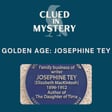
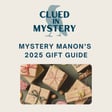
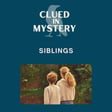

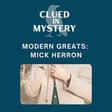

![[Bonus] Read Along: Daughter of Time image](https://media.zencastr.com/cdn-cgi/image/width=112,quality=85/image-files/61e1c276e3ec42007857cff9/b953ad72-c43e-48ca-a18a-b3c216ab90ee.jpg)
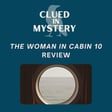
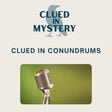
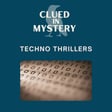
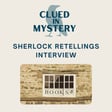
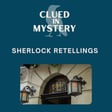

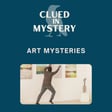

![[Bonus] Thursday Murder Club preview image](https://media.zencastr.com/cdn-cgi/image/width=112,quality=85/image-files/61e1c276e3ec42007857cff9/e51be644-e446-4d32-b89c-12bfc60d30e9.jpg)
![[Re-release] Hallmark Mysteries and More (part 2) image](https://media.zencastr.com/cdn-cgi/image/width=112,quality=85/image-files/61e1c276e3ec42007857cff9/edbc4a22-ebb8-42cb-b211-1f94f4cb920f.jpg)
![[Re-release] Golden Age Author: Ngaio Marsh image](https://media.zencastr.com/cdn-cgi/image/width=112,quality=85/image-files/61e1c276e3ec42007857cff9/782f9391-308c-4bad-9197-749bef7d8bd1.jpg)